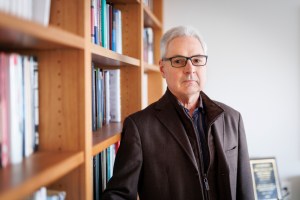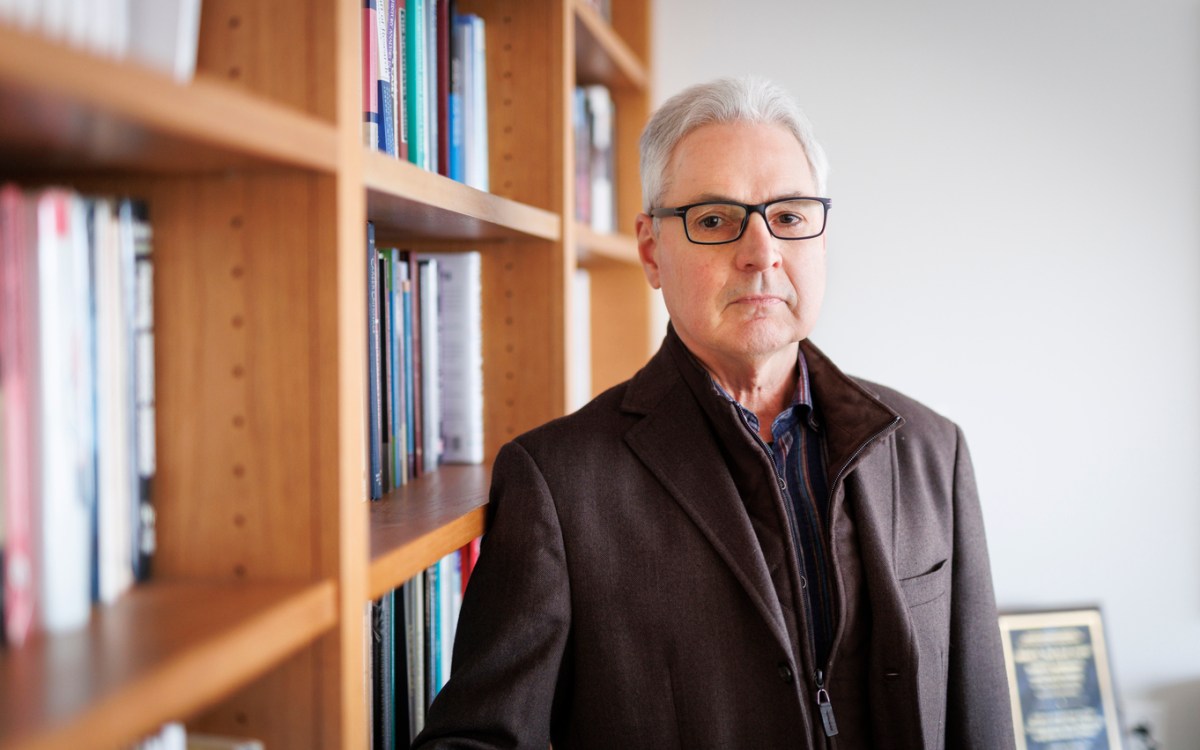Freezing funding halts medical, engineering, and scientific research

Projects focus on issues from TB and chemotherapy to prolonged space travel, pandemic preparedness
The Trump administration’s decision to freeze more than $2 billion in long-term research grants to Harvard has put a halt to work across a wide range of medical, engineering, and scientific fields. The action came in response to the rejection of White House demands for changes that the University argues infringes on its independence and constitutional rights and exceeds the administration’s lawful authority.
The NIH had earlier halted an estimated $110 million in grants to Harvard and its associated hospitals since late February.
We interviewed some of the researchers whose projects have been halted or face an uncertain future.
Sarah Fortune
John LaPorte Given Professor of Immunology and Infectious Diseases, and chair of the Department of Immunology and Infectious Diseases, Harvard T.H. Chan School of Public Health
Research interrupted: A $60 million seven-year, multi-institutional consortium to study how the immune system controls tuberculosis.
“About a third of the world is thought to be infected with TB and carry TB, and most of those people will not get sick. But every year, 10 million people get sick, and 1 million people die, which makes TB the world’s leading infectious cause of death. We’re trying to understand the difference between protective and failed immunity to TB to better identify people with TB and then prevent TB, ideally with an effective vaccine.
“This consortium was conceived of at the National Institutes of Health as their moonshot effort to move the needle on TB. The goal was to bring together the very best researchers from around the country and around the world to bring the very best cutting-edge technology, the very best science to understand TB immunity. And if it stops, the whole thing is gone.
“I’ve been building this consortium since about 2014. For me, this is over a decade of work. Scientific knowledge, scientific expertise is a craft. And if you blow it up, you can’t just rehire people and recreate it and then start again. It’s gone.”
[Open Philanthropy, a California-based philanthropic group, has authorized a $500,000 grant to allow researchers at the University of Pittsburgh School of Medicine to complete an ongoing tuberculosis vaccine study, The Boston Globe reported Monday. That study is a single piece of the broader project Fortune is working on as a principal investigator.]
Donald E. Ingber
Founding director of the Wyss Institute for Biologically Inspired Engineering at Harvard, Judah Folkman Professor of Vascular Biology at Harvard Medical School and the Vascular Biology Program at Boston Children’s Hospital, and Hansjörg Wyss Professor of Bioinspired Engineering, Harvard John A. Paulson School of Engineering and Applied Sciences
Research interrupted: Two contracts worth under $20 million: one to test and develop drugs to treat long-term radiation exposure, including chemotherapy, and the other to study the effects of microgravity and radiation in space on human cells to help astronauts travel to Mars.
“Both projects were contracts administered by the Biomedical Advanced Research and Development Authority (BARDA), which is responsible for developing countermeasures for biological, radiation, and chemical threats for the U.S.
“The larger BARDA contract focuses on development of human organ-on-a-chip microfluidic culture models of human lung, intestine, bone marrow, and lymph to model the human response to exposure to gamma radiation, and to identify potent radiation countermeasure drugs. We have made great progress on this project.
“The BARDA project supported by NASA is to use human organ-on-a-chip technology to create living ‘avatars’ of astronauts by lining the chips with cells from astronauts and then flying the chips alongside them on space missions. The goal is to use these to understand the effects of microgravity and radiation (which currently makes it impossible for man to go on long space flights, to Mars, for example) and again, develop countermeasures. This initial project is to demonstrate the feasibility of this approach.
“Radiation countermeasure drugs we are developing would be valuable for cancer patients, many of whom receive radiation therapy and experience side effects (higher and more effective therapeutic doses could be administered with less toxicity) as well as be stockpiled to protect against a nuclear disaster or attack; and they could enable long term spaceflight, and hence, exploration of Mars, which is not possible now.
“As for what the repercussions are, it means that this type of work would stop but more importantly that the salaries of almost 20 students, fellows, and staff are at risk if this stop order is not reversed soon.”
Duane Wesemann
Associate professor of medicine, Harvard Medical School
Research in peril: A $10 million project grant to fund a large consortium of laboratories to study the immune system and its ability to respond to different coronaviruses as preparation for future possible pandemics. That grant was halted before the most recent freezes and later temporarily reinstated by a court order pending appeal.
“What we learn from coronaviruses is relevant to other infections because we’re trying to understand how the immune system operates.
“We were finishing up our third year of a five-year plan. The termination was a surprise.
“There are multiple levels of loss. On one level, these grants from the NIH are vetted very heavily by independent scientific review, and there’s only a small percentage of grants that end up getting funded because of the review process. Grants like this and others that are terminated, which have been vetted, scored, and deemed important, rigorous, and worthy to happen, represent a loss of all the effort that went into the process.
“For our lab, it is a huge loss of opportunity. We have been collecting longitudinal blood samples from several individuals over many years to try to understand the long-term effects of immunity to the virus, infection, as well as vaccination, to study how long-lasting things are, and what regulates the longevity of the immune response.
“We may have to cancel collecting blood from this cohort. To see this happen to our lab and to see it happen to other labs across the country is devastating.”
Subhash Kulkarni
Assistant professor of medicine, Harvard Medical School
Research facing uncertainty: A $3.5 million neuroscience research project that studies how the neurons in the gut change with aging and conditions such as Parkinson’s and Alzheimer’s diseases.
“My research project has not been stopped yet. Whether it will be stopped or not is something that I don’t know.
“My project is based at my research lab, which is a neuroscience lab that studies the gut. We study the neurons that reside in the gut and regulate the human functions related to eating, digesting, and defecation.
“It is important to understand how these neurons change with aging or with conditions such as Parkinson disease, Alzheimer’s disease, or irritable bowel syndrome. What our lab does is try to understand how the neurons in our gut age, and what can we do to make them young again.
“This is an ongoing project. Our ability to keep on going depends upon our ability to keep putting in grants and getting in the money because we are at the end of our grant cycle. If our grants don’t get funded, all that research stops, and the years of work will go wasted. We are in the last year of a five-year grant. If the grant is curtailed even before the time ends, then the work will stop immediately.
“One of the main things to remember is that when we get funding, part of that goes toward salaries, but a significant part goes towards buying reagents and chemicals from American manufacturers and buying mice from American companies. Every single dollar of federal funding is spent toward people’s salaries and reagent materials that are here in the U.S.
“Our ability to train undergraduates, who are American, all stops immediately if our funding gets stopped.”
“There is uncertainty right now. We don’t know how it’s going to go.
“We hope that crucial research is not stopped because every research that we do at HMS and elsewhere is a result of a highly competitive process. This is not funding that we get because of the largess of the federal government. We have to compete with every single lab around the entire country and it’s a function of that competitive process that we get grants to do the work that we do.”




